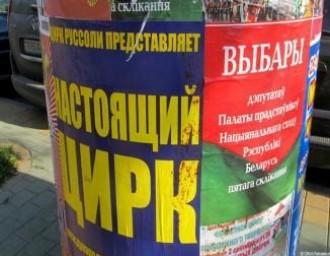Andrei Kazakevich: Cosmetic changes in the law do not influence the election process

The main role in the election process plays the political culture of the society, not the legislation; that is why we cannot reach much by changing the latter.
This opinion shared with the EuroBelarus Information Service the director of the Institute for Policy Studies Palіtychnaya Sphera (Political Sphere) Andrei Kazakevich.
- Certain changes in the election law won’t be that essential, all the more so that they are introduced almost before each election. But it doesn’t change the essence of the election process in Belarus, - says Andrei Kazakevich.
As is known, Aliaksandr Lukashenka charged the Administration of the President with the preparation of the agreed suggestions about the changes in the Election Code. The draft should be ready in May and submitted to the President in order to be introduced to the Parliament.
Today a number of changes are going to be introduced into the Belarusan election process. As Lidzija Jarmoshyna, the head of the Central Election Committee notified some renewed points correspond to the OSCE demands. For instance, election summing-up procedure is going to be simplified, i.e. Belarus can adopt the single ballot parliamentary election system. If it is adopted, then the election in the country will cost 30 per cent less, as second route of voting will disappear as such.
To a certain degree it meets the OSCE demand to reduce or to cancel the electorate level. Besides, today practically any controversial point at the elections can be brought to the court; OSCE has the same suggestions.
The election campaign cannot include urges to boycott the elections and this norm will be described in the law. “We are suggesting forbidding it right now. If the candidate wants to call for the boycott – you are welcome, go to the executive committee, and organize a public rally and boycott as long as you want to. Not as a candidate, but as a common citizen, as a representative of a political party”, - explained Lidzija Jarmoshyna.
Andrei Kazakevich believes that all these changes are cosmetic and he doesn’t see any potential to change the course of elections by introducing them.
According to the political scientist, only the presence of the political will can influence the election process. If suddenly, due to some reasons, the authorities found it reasonable to carry out more or less open campaign, not to give administrative orders to falsify the results of the elections, to guarantee the equality of the candidates in reality and so on, they would do that.
The director of the “Political Sphere” agrees with the head of the Central Election Committee in that there are no common criteria of election evaluation, “as the systems of national legislations and national election traditions vary a lot in different countries”.
The political scientist highlighted that the chief moment for elections is the entrepreneurial practice and a certain level of political culture, not the legislation:
- Anything can be written in the law; however, the main question lies in how they are observed and what political culture exists in the country. Though the change of legislation influences the political culture, but it doesn’t define the course of the political process directly.
-
03.01
-
07.10
-
22.09
-
17.08
-
12.08
-
30.09








































